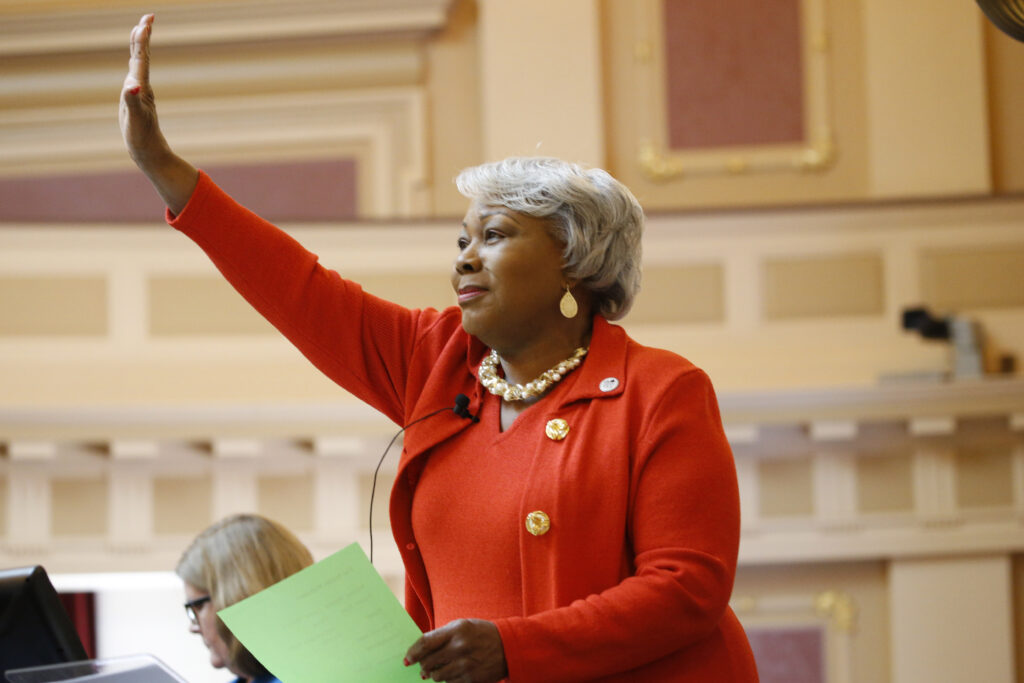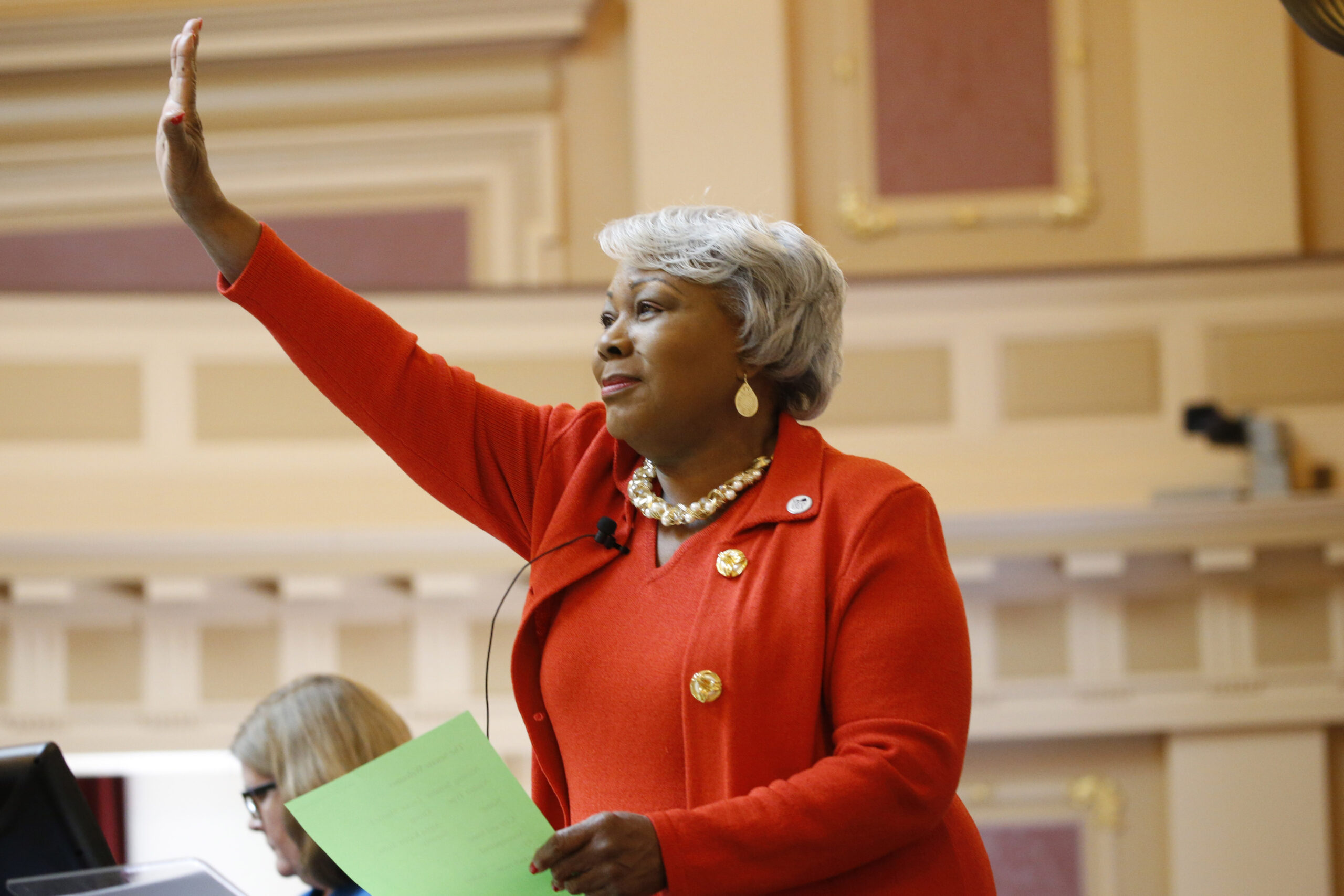A political earthquake reshaped the Virginia landscape on Nov. 7 and, in doing so, may have reshaped the national landscape for next year’s White House election.
For the first time, Black legislators will serve as Democratic majority leaders of both the House of Delegates and the State Senate, adding a little more blue influence to this significant purple state. This is a remarkable feat in this commonwealth that perfected slavery in the mid-1600s, then notoriously suppressed the Black vote and resisted school desegregation during the 1950s to 1960s civil rights era.
State Sen. Louise Lucas of Portsmouth, and Del. Don L. Scott Jr., also representing Portsmouth, will lead their majorities and share power with Republican Gov. Glenn Youngkin. The governor’s political ally, Lt. Gov. Winsome Earle-Sears, the first Black woman elected to statewide office, will preside over the state Senate. Lucas meanwhile will be the first Black woman to serve as president pro-tempore.

Portsmouth is part of the Hampton Roads metropolitan area of 1.8 million people that includes Norfolk, Virginia Beach, and Hampton. The region is 30 percent Black.
Youngkin, who was elected in 2021 by espousing a conservative agenda while not ever mentioning presidential election insurrectionist Donald Trump, this year supported Republican candidates who ran on anti-abortion, tough-on-crime platforms. Youngkin urged Republicans to vote early or vote by mail, unlike the 45th U.S. president, who in 2020 spurned those options and lost the Electoral College and popular vote tallies.
Lucas, Scott, and fellow Democrats promised to serve as a metaphorical firewall against attempts to weaken abortion rights, and they painted many of their GOP opponents as Jan. 6, 2021, insurrection sympathizers. The Democrats in the Senate prevailed and held their slim 21-19 majority, while in the other chamber that party flipped the former Republican majority House to a 51-49 advantage, pending the outcome of a recount in a southern Virginia district where the Republican candidate won by 78 votes and the margin of victory was a fraction of 1 percent.
The symbolism of the Lucas and Scott ascendency was unavoidable, however as racial trailblazer L. Douglas Wilder cautioned, what will only matter is results. “It is historic,” the first Black governor of any state since Reconstruction, told the Washington Post Nov. 11. “It’s celebratory, but it’s not an endgame – a beginning in terms of what needs to be done.”
Lucas is a senior member of the Virginia Senate. She was elected to the Virginia General Assembly three decades ago. Her major accomplishment was promoting and facilitating Atlantic City-style casino gambling in Portsmouth and Bristol in rural Southwest Virginia, with two more casinos scheduled to open at the end of the year in Danville [southwest Virginia] and Norfolk, the latter run by the indigenous Pamunkey tribe. The four venues are in financially stressed communities that anticipate revenue relief.
Lucas is also a verbal brawler. During spring primary season, she accused Democrats in the Virginia suburbs of Washington, D.C., of attempting to sabotage her re-election in a scheme to block her from becoming chairwoman of the powerful Finance Committee, a seat routinely held by Northern Virginians, the Associated Press reported in May. Lucas beat a Black conservative Democrat in the primary challenge and doused the conflict.
With that battle won, Lucas pivoted to sparring with Republicans. After the Democratic takeover of both legislative chambers, she lampooned Youngkin for spending millions of dollars yet failing to beat Democrats, Mother Jones magazine reported the day after the election.
Meanwhile, Scott as the minority leader tangled with Youngkin over public education and attempts to minimize or water down Black history and culture in curriculums. In January 2022 during the governor’s first week in office, Scott questioned the religious faith of the publicly pious governor, saying it was not reflected in his crusade against “critical race theory” and “racial equity.” Scott’s broadside resulted in Younkin walking from the governor’s mansion to the statehouse to meet with Scott privately. Both men shook hands.
Unlike Virginian Lucas, Scott is a transplant from Texas. He studied at Texas A&M University, then served in the Navy, which earned him cool points in defense-saturated Hampton Roads. After military service, Scott entered law school at Louisiana State University. During his final year, federal agents arrested him for holding a cache of drugs for a friend, a mistake Scott acknowledged. He earned the law degree before serving nearly eight years of a 10-year prison sentence. Scott moved to Delaware, then settled in Virginia. He was prohibited from voting in the commonwealth because of the felony conviction, but Scott appealed to have his rights restored. A decade ago, Republican Gov. Robert McDonnell obliged.
Despite past kerfuffles with Youngkin and his GOP legislative allies, the test for Scott – and Lucas – is what they will accomplish now that they hold the reins – or short leashes — of majority power. A preview was initial fillings of bills for the January legislative session. Democrats proposed a state constitutional amendment to guarantee access to abortion, raising the minimum wage, and a ban on assault-style guns. Youngkin’s office said in response, “The governor will review all legislation when it comes to his desk. As has been the case in the last two sessions, every bill that becomes law will require bipartisan collaboration.”
The Republican Party of Virginia in a statement called the Democratic initial proposals “a slate of radical bills that would upend existing law and turn our commonwealth into a failed left-wing state like California or New York.”
Virginia’s 2024 political forecast looms large: It is a purple state that will play a significant role in national elections. The rural and some suburban areas are Republican red while the Virginia Crescent that bends along Interstate 95 and then Interstate 64 has the blue urban/suburban areas of Northern Virginia, Richmond, and Hampton Roads. Also, one third of Virginia registered voters are independents who can flip elections to either party. The independents tend to be fiscally conservative, but socially moderate.
Again Wilder, a maverick who occasionally befriended Republicans while serving as governor in the early 1990s, proffered advice to Lucas and Scott: “Being elected the first Black or any Black is not what it’s about. It’s about being the most effective person … The people of Virginia will gauge, and judge based on performance and levels of competence, not the color of your skin. And there’s no time to rest on laurels.”








